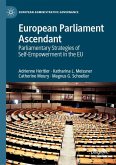Seminar paper from the year 2008 in the subject Politics - Topic: European Union, grade: 1,0 (sehr gut), Berlin School of Economics and Law (Europäisches Verwaltungsmanagement), course: Europäische Kohäsionspolitik, language: English, abstract: 1.) Analysis of the relationship between the two objectives of the cohesion policies: growth and reduction of disparities, taking into account any contradictions, tensions, or completions between these objectives.2.)Analysis and comparison of the thematic priorities of the European Regional Development Fund (EC) No. 1080/2006 and the European Social Fund (EC) 1081/2006 in the light of overall objectives for the cohesion policies to regard differences in scope, similarities and potential synergies.3.) Analysis of the present distribution of the financial means of the European Structural Funds, as well as the main reasons and criteria for this decision of distribution. Assessment of the adequacy of the existing distribution and reasons for its conception.4.) Systematic differentiation of European Structural Funds and European funding programmes on the basis of self-developed criteria .5.) Contribution of the quality of regional public administration services to an effective and efficient implementation of the European Structural Funds.Introduction:In March 2000 at the Lisbon Spring Council, the 15 European Union (EU) leaders at that time agreed that the EU should commit to raising the rate of growth and employment to underpin social cohesion and environmental sustainability. The EU set itself "a strategic goal for the next decade: to become the most dynamic and competitive knowledge-based economy in the world, capable of sustainable economic growth with more and better jobs and greater social cohesion, and respect for the environment". In June 2001 in Göteborg, the strategy adds the environmental dimension to the Lisbon Strategy (LS) and is conceived as a completion of the EU commitment to economic and social renewal. The new, more complete, and ambitious EU sustainable development strategy with objectives, indicators and an effective monitoring procedure should be based on a long-term positive vision and fully include the external dimension. In 2005 the results did not meet expectations, so the strategy had been renewed to have new impulses. As a result of the renewed LS, the cohesion policy for the programming period 2007-2013 is marked by the objectives of growth and jobs agenda, especially in the areas of innovation, research, skills, and human capital, and additionally brought reform of the objectives and funds.








